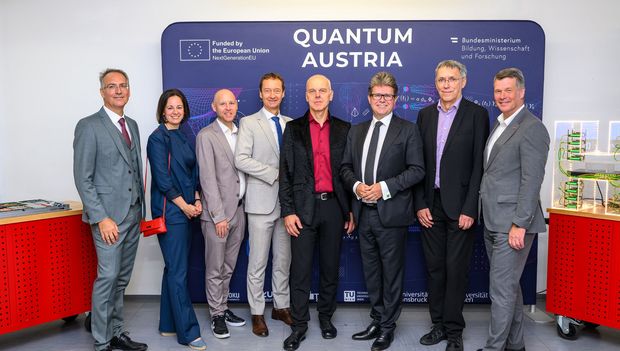The Johannes Kepler University Linz is now part of the new high-performance computing cluster, MUSICA (Multi-Site Computer Austria).

MUSICA opens the door to a dramatic boost in available computing capacity and will significantly improve AI application performance. MUSICA will be installed at the JKU during the first half of 2025, and regular operations are expected to begin during the third quarter of 2025.
Conducting cutting-edge research in many fields today requires state-of-the-art computing power. Austria intends to upgrade its current computing capacities by installing the “Multi-Site Computer Austria” (MUSICA), a computer cluster with simultaneous operations at universities in Linz, Vienna, and Innsbruck. Altogether, €36 million will be invested across all three locations.
JKU Rector Stefan Koch is looking forward to the supercomputer at the JKU: “The JKU has been conducting cutting-edge research for a number of years, including in the fields of artificial intelligence and quantum physics. Boosting computing power is essential if we want to continue expanding on our expertise. MUSICA is a tremendous new opportunity and I am delighted that the JKU is part of this new high-performance computing cluster.”
Austrian Federal Minister of Education, Science & Research, Martin Polaschek, underlined just how important MUSICA is: “Now, more than ever before, conducting cutting-edge research depends on having just right infrastructure and strong computing power. When it comes to our national research community, the 'MUSICA' project is a milestone, contributing significantly to conducting world-class research, particularly in the fields of AI and quantum research.”
New Opportunities to Conduct Groundbreaking Research at the JKU
The MUSICA section at the JKU is a configuration specifically tailored to the JKU's special focus on AI as it features 80 GPU nodes and 48 CPU nodes. JKU researchers will benefit greatly from the new system architecture, especially those who perform complex data-intensive calculations, such as training artificial intelligence and analyzing large amounts of data. One example is the Austrian Science Fund (FWF) Cluster of Excellence project led by JKU and AI pioneer Sepp Hochreiter, “Bilateral AI”, aimed at creating a new level of AI.
A New Data Center at the JKU
MUSICA will be installed at the JKU during the first half of 2025, and regular operations are expected to begin during the third quarter of 2025. JKU Vice-Rector Alexander Freischlager remarked: “For the time being, MUSICA’s hardware section will be installed in a specially modified data center at the JKU and will go live by no later than the third quarter of 2025. The long-term plan is to transfer the infrastructure to the joint JKU and IT:U Data Center. The plans are currently in the works and in the future, the two universities will jointly operate the Computing Center.”
The JKU is planning to add a GPU Computing Center to MUSICA. In AI research, high-performance GPU computing is a key component requiring trained experts at a core facility who are able to provide researchers with support services. A Scientific Board responsible for evaluating, facilitating, and prioritizing projects will supplement the unit.
About MUSICA
MUSICA delivers significantly more computing power to users. The VSC-4 and VSC-5 – Austria’s fastest supercomputers to date - deliver a combined output of 5.01 petaflops (computing operations per second). The new high-performance computing cluster will deliver computing power of approximately 40 petaflops, making it one of the world's most powerful systems. In the past, several universities operated Austria's most powerful supercomputers together (the Vienna Scientific Clusters, VSCs), however, everything was centrally operated and participating institutions just had online access. One new aspect as part of the MUSICA initiative is to share the computer hardware itself across several locations, combining high-performance computing (HPC) with cloud computing.
The system is split across three locations to heighten resilience. All three locations will be centrally configured and maintained, but they can also operate independently. Users can access MUSICA as they would a single HPC system.
The system is primarily water-cooled, meaning water-flow cooling elements are used to dissipate heat from its GPU and RAM processors, significantly reducing the amount of energy required for cooling. The water’s high temperature of approximately 40°C allows the waste heat to be released directly into the surrounding atmosphere throughout most of the year, eliminating the use of additional energy-intensive cooling units. The high temperature of the cooling water means that waste heat can be reused.
MUSICA's operating system delivers the maximum computing power to conduct scientific research with minimal energy consumption, thereby setting new standards in state-of-the-art energy efficiency.
Funding for MUSICA is provided as part of the European Union's Recovery and Resilience Plan and the Quantum Austria research initiative, with an additional €16 million in funding by the Austrian Federal Ministry of Education, Science & Research (BMBWF) to double the computing power. This makes MUSICA a central part of a fully integrated, hybrid infrastructure to support quantum and HPC computing.
Partners:
The following partners are involved in Austria’s MUSICA project:
- Project coordinator: Vienna University of Technology
- Project partners: University of Vienna, University of Natural Resources and Life Sciences Vienna, University of Innsbruck, Graz University of Technology, Johannes Kepler University Linz








